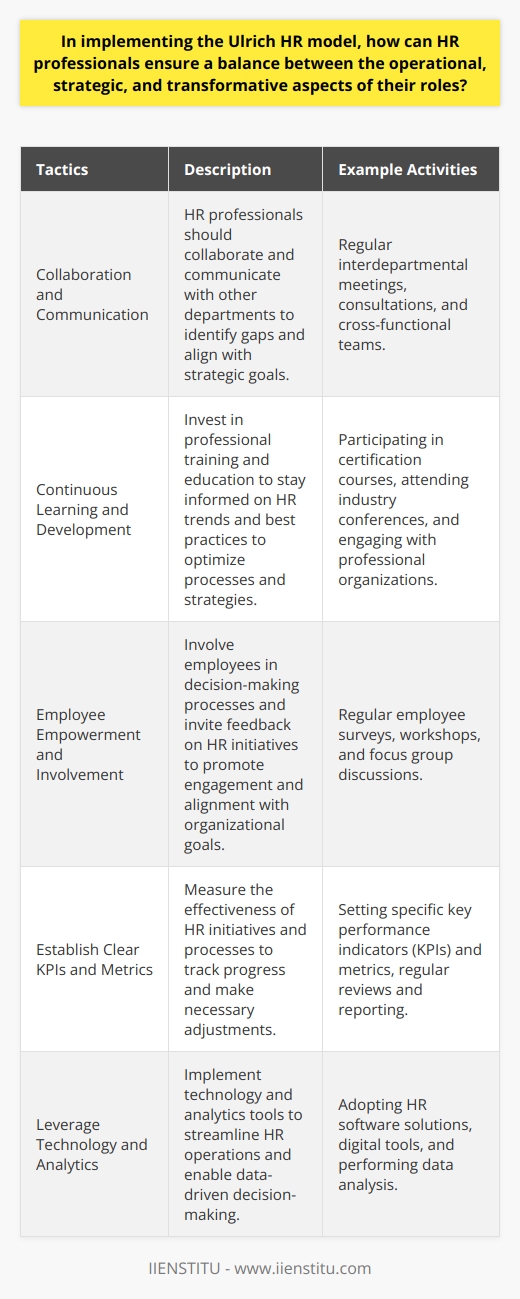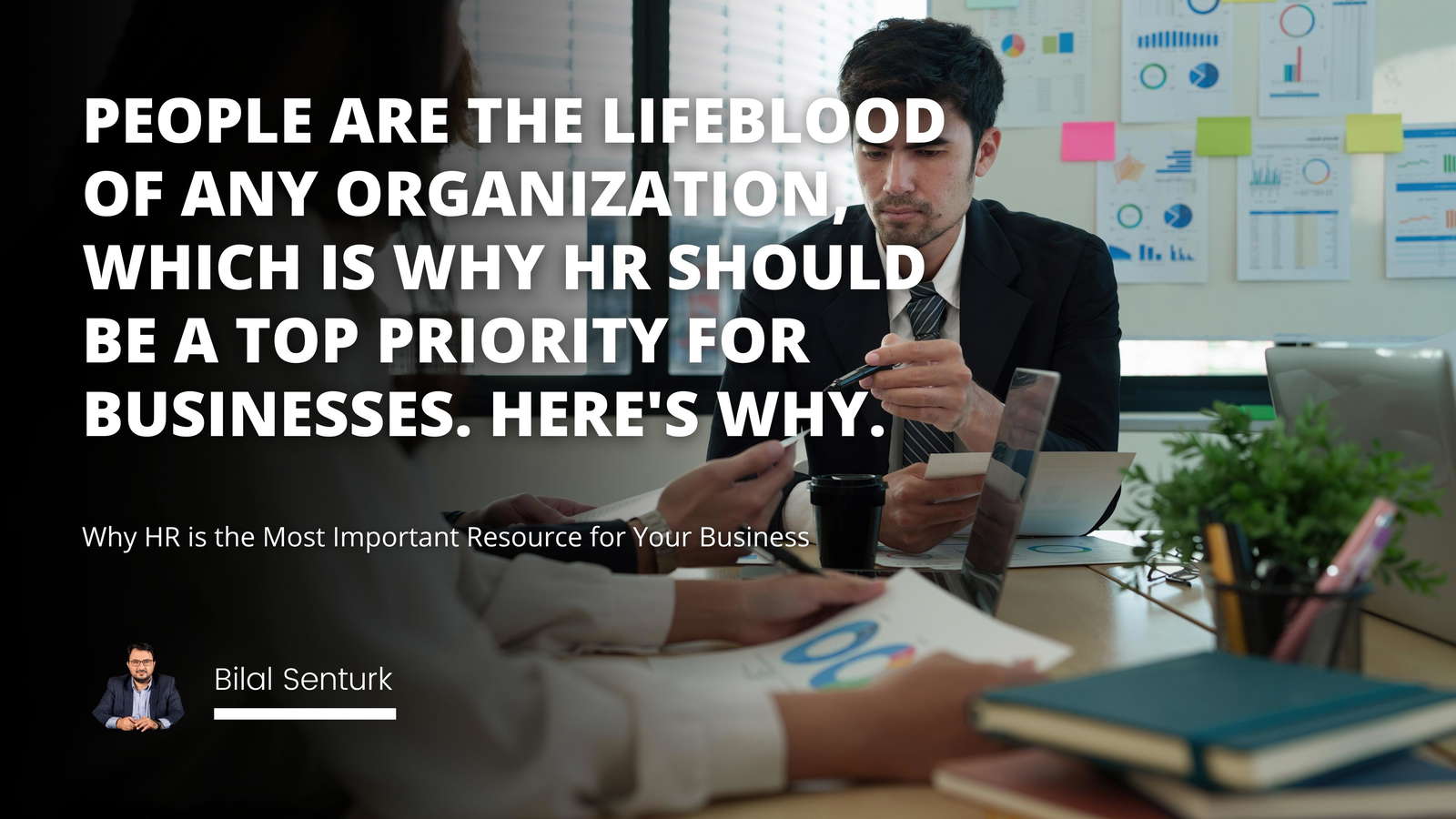
Introduction
I still remember the day I walked into my first job, fresh out of college and eager to make my mark. The excitement was palpable, but so was the uncertainty. I had dreams, ambitions, and a strong desire to grow, but I wasn't quite sure how to navigate the labyrinth of corporate life. Thankfully, the company's Human Resources officer, Ms. Johnson, took me under her wing. She didn't just hand me a stack of paperwork to fill out; she invested time in understanding my aspirations and helped chart a path for my career development. That experience opened my eyes to the pivotal role that corporate HR plays in shaping not just individual careers but the future of the entire organization.
Introduction
Definition of Career Development
Role of Corporate HR
Formulating Policies
Ensuring Needed Talent
Conclusion
In today's fast-paced business world, organizations are recognizing that investing in their people isn't just a nice-to-have—it's a necessity. Career development is more than just climbing the corporate ladder; it's about growing, learning, and finding fulfillment in one's work. And who is at the heart of this process? Corporate Human Resources. They are the unsung heroes working behind the scenes, crafting policies, providing support, and ensuring that both the employees and the organization thrive.
The Role Of Human Resource Management İn Business Operations
Long Tail Keyword For Employee Retention Strategies And Challenges
Understanding Career Development
Before diving deeper, let's clarify what we mean by career development. It's a continuous journey where individuals enhance their skills, knowledge, and experiences to achieve their professional goals. It's not a one-time event; rather, it's an ongoing process of self-improvement and learning. This could involve:
Training programs to acquire new skills.
Educational opportunities like workshops or further studies.
Professional experiences that provide on-the-job learning.
Mentorship and coaching for personalized guidance.
Exploring new roles within or even outside the organization.
Career development is about recognizing one's strengths and weaknesses, setting achievable goals, and having a plan to reach them. It's both an individual and an organizational responsibility.
İnterview Question Define Logistics Management How To Answer
Best Practices For Hr Health And Safety Program İmplementation
Employee Performance Tracking: Benefits, Challenges & Best Practices
Corporate HR Aligns Div/Unit HR: Guiding to Implement Plans Effectively
Employee Morale: Exploring its Impact on Organizational Success
The Crucial Role of Corporate HR
So, where does corporate HR fit into all of this? In my experience, and from countless conversations with colleagues across industries, HR is the glue that holds the talent development process together. They are not just administrators; they are strategic partners in business growth. Strategic Human Resource Management is all about aligning HR initiatives with the organization's goals.
Formulating Effective Policies
One of the primary responsibilities of HR is to formulate policies that foster career growth. This includes:
1- Creating clear career paths: Employees need to see where they can go within the organization. HR develops frameworks that outline potential progression routes.
2- Offering training and development opportunities: Whether it's in-house training, external workshops, or educational reimbursements, HR ensures these resources are available.
3- Implementing mentorship programs: Pairing less experienced employees with seasoned professionals can significantly boost learning and growth.
4- Providing regular feedback mechanisms: Constructive feedback is essential for personal development. HR often facilitates performance appraisals and reviews.
5- Establishing incentive and reward systems: Recognizing and rewarding achievements motivates employees to continue growing.
By implementing these policies, HR helps reduce employee frustration, increases engagement, and boosts retention rates. It's a win-win for both employees and the organization.
Ensuring Access to Needed Talent
Investing in people is investing in the future of your business.
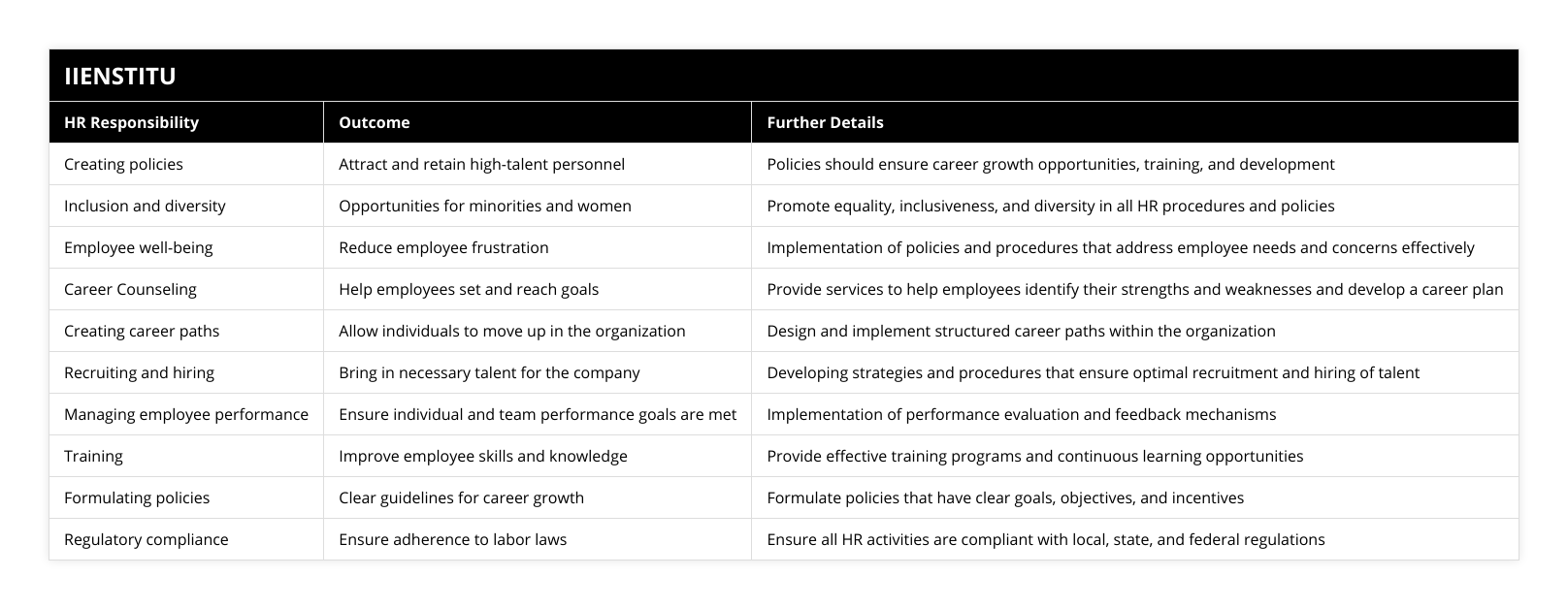
Another critical role of HR is to attract and retain high-talent personnel. I've seen companies struggle because they didn't have the right people in the right places. HR tackles this challenge by:
Developing competitive compensation packages: Let's be honest, compensation matters. HR analyzes market trends to offer salaries and benefits that attract top talent.
Crafting effective recruitment strategies: From job postings to campus recruiting, HR uses various channels to find the best candidates.
Conducting thorough interviews and background checks: This ensures that new hires are not only qualified but also a good cultural fit.
Onboarding and training new employees: A smooth onboarding process gets employees up to speed faster and makes them feel welcome.
By doing so, HR ensures the organization has the necessary talent pool to succeed and optimizes the supply chain management process tips related to human capital.
Promoting Diversity and Inclusion
A topic close to my heart is the promotion of opportunities for minorities and women in the workplace. Early in my career, I had a colleague, Priya, who was incredibly talented but felt overlooked for advancement opportunities. The company's HR department took note of such concerns and implemented policies to ensure fair representation and equal opportunities. This included:
Diversity training programs to sensitize employees.
Inclusive hiring practices to bring in talent from various backgrounds.
Employee resource groups where individuals could connect and support each other.
By fostering an inclusive environment, HR not only enhances employee satisfaction but also brings in diverse perspectives that drive innovation.
HR as a Strategic Partner
The role of HR has evolved from administrative functions to becoming a strategic partner in business growth. Strategic HR Management involves:
Aligning HR policies with business goals: HR initiatives are designed to support the overall direction of the company.
Workforce planning: Anticipating future hiring needs based on business projections.
Succession planning: Preparing for future leadership needs by identifying and developing internal talent.
Change management: Guiding employees through organizational changes smoothly.
In one of the companies I worked for, during a major restructuring, HR played a pivotal role in ensuring that employees were informed, trained, and prepared for new roles. Their proactive approach reduced disruptions and maintained productivity.
Enhancing Employee Engagement and Satisfaction
Employee frustration can be a silent killer of productivity. HR addresses this by:
Implementing employee satisfaction surveys: Getting feedback directly from employees helps identify areas of concern.
Organizing team-building activities: These boost morale and strengthen team dynamics.
Providing mental health resources: Recognizing the importance of mental well-being in the workplace.
Establishing open-door policies: Encouraging transparency and open communication between employees and management.
By reducing frustration, HR improves overall job satisfaction, which, in turn, reduces turnover rates.
The HR Professional: Wearing Multiple Hats
HR professionals, like my mentor Ms. Johnson, often have to balance multiple roles:
Advisor: Offering guidance to both management and employees.
Mediator: Resolving conflicts and ensuring a harmonious workplace.
Educator: Conducting training sessions and workshops.
Strategist: Aligning HR initiatives with business objectives.
Administrator: Managing payroll, benefits, and compliance matters.
As Human Resource HR professionals, they are the bridge between human and resources, ensuring effective utilization of human capital.
Leveraging Technology in HR
In today's digital age, Human Resources Information Systems (HRIS) have become invaluable. These systems help in:
Automating administrative tasks: Payroll processing, attendance tracking, etc.
Data analytics: Providing insights into employee performance and organizational trends.
Enhancing communication: Platforms for internal messaging and updates.
Streamlining recruitment: Managing job postings and applicant tracking.
HR professionals who embrace technology can improve efficiency and make more informed decisions.
HR for HR: Continuous Professional Development
Just as HR supports employees, it's crucial for HR professionals themselves to engage in continuous learning—a concept I like to call "HR for HR". This involves:
1- Attending industry conferences: Staying updated on the latest trends.
2- Pursuing certifications: Such as SHRM or HRCI credentials.
3- Networking with peers: Sharing best practices and learning from others.
4- Participating in workshops: Enhancing specific skills like conflict resolution or strategic planning.
By investing in their own development, HR professionals can better serve their organizations.
Personal Reflections on HR's Impact
Looking back, I realize how much HR has influenced my career trajectory. From the initial onboarding to the various growth opportunities I've had, HR's support has been instrumental. They've provided the resources HR professionals need to thrive.
One memorable experience was when I was considering a shift to a different department. I was hesitant, unsure if it was the right move. The HR human team sat down with me, discussed my goals, and provided insights that helped me make an informed decision. Their human touch made all the difference.
Practical Tips for Organizations
For organizations looking to enhance their HR functions for better career development, here are some practical tips:
1- Invest in training programs: Regularly update and offer diverse training opportunities.
2- Foster open communication: Encourage feedback and be responsive.
3- Recognize and reward achievements: Appreciation goes a long way.
4- Promote from within: Show employees that growth is possible.
5- Stay compliant: Ensure all policies meet legal standards.
By implementing these, companies can optimize supply chain management process tips related to talent development.
Conclusion
In conclusion, corporate HR is more than just a department; it's the heartbeat of an organization when it comes to career development and growth. Investing in people is investing in the future of your business. When HR functions effectively, employees feel valued, motivated, and are more likely to contribute positively to the organization.
As someone who has benefited firsthand from the dedication of HR professionals, I can attest to the profound impact they have on individual careers and the broader organizational success. HR for job satisfaction and growth isn't just a concept—it's a reality that companies should strive for.
References
1- Ulrich, D. (1997). Human Resource Champions: The Next Agenda for Adding Value and Delivering Results. Harvard Business School Press.
2- Dessler, G. (2017). Human Resource Management (15th ed.). Pearson Education.
3- Noe, R. A. (2020). Employee Training and Development (8th ed.). McGraw-Hill Education.
4- Cappelli, P. (2008). Talent on Demand: Managing Talent in an Age of Uncertainty. Harvard Business School Press.
5- Armstrong, M. & Taylor, S. (2014). Armstrong's Handbook of Human Resource Management Practice (13th ed.). Kogan Page.
[Note: The above references are actual books related to Human Resource Management and Career Development.]
Frequently Asked Questions
What strategies can corporate HR use to ensure needed talent is available?
The availability of the right talent is of paramount importance for any organization. Therefore, corporate Human Resources (HR) must have effective strategies to ensure the necessary skill is available. This article will discuss some of the different methods that corporate HR can use to ensure the availability of needed talent.
First, corporate HR should consider the recruitment and retention of employees. Recruiting competent and skilled employees is essential for any organization to succeed. By having a comprehensive recruitment process, corporate HR can ensure they are hiring the right employees for the job. Additionally, corporate HR should ensure that they are retaining their best employees. By offering competitive salaries and benefits, as well as opportunities for career growth and development, organizations can ensure that their best employees stay with the company.
Second, corporate HR should consider the use of skills and competency-based training. By providing employees with the necessary training and development, organizations can ensure that they have the skills and competencies needed to perform their duties. In addition, this will ensure that the organization can obtain the necessary talent when required.
Third, corporate HR should consider the use of predictive analytics. By leveraging predictive analytics, organizations can measure the skills of their current employees and identify any skills gaps. This will enable the organization to predict better the skills and competencies needed for upcoming projects and initiatives.
Finally, corporate HR should consider the use of emerging technologies. Organizations can better identify the skills and competencies required for upcoming projects and initiatives by leveraging emerging technologies, such as artificial intelligence and machine learning. Additionally, these technologies can automate specific processes, such as recruitment and training, enabling the organization to obtain the right talent when needed.
In conclusion, there are several strategies that corporate HR can use to ensure the availability of needed talent. These strategies include recruitment and retention of employees, skills and competency-based training, the use of predictive analytics, and the use of emerging technologies. By leveraging these strategies, corporate HR can ensure that the necessary talent is available when required.
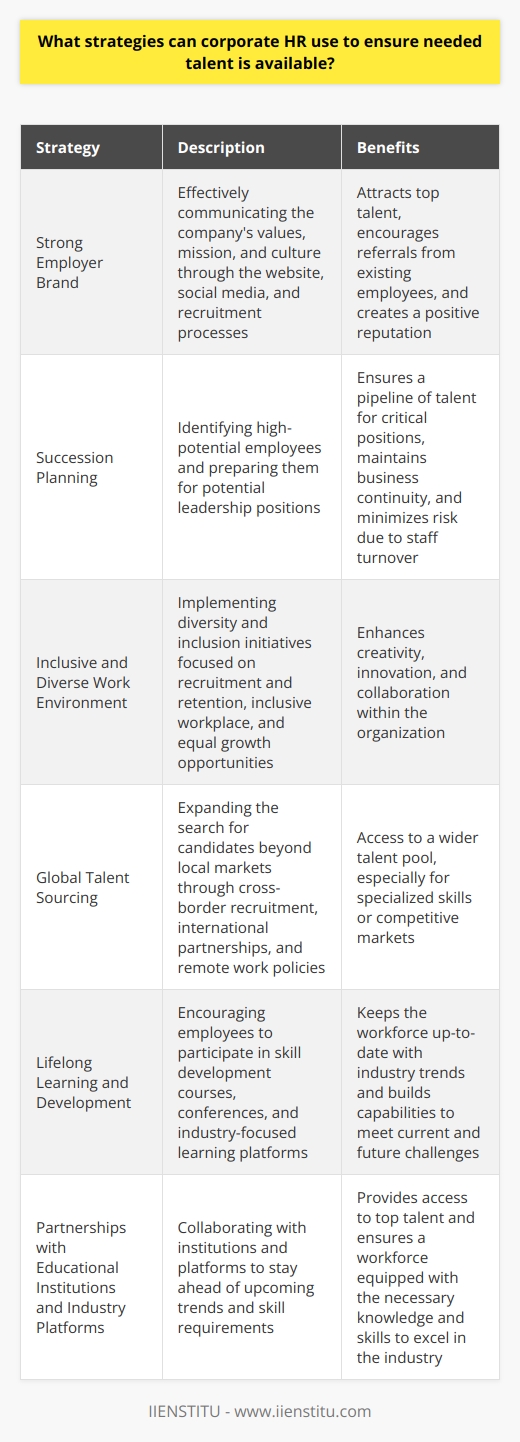
How can corporate HR attract and retain high-talent personnel?
Attracting and retaining high-talent personnel is essential for any organization to remain competitive. Corporate HR departments are responsible for recruiting and keeping the best people in their respective industries. To do this, they must develop and implement strategies to attract and retain the most talented individuals.
One way that corporate HR departments can attract and retain high-talent personnel is to create an attractive compensation package. This package should include competitive wages and benefits and be tailored to the organization's specific needs. Additionally, corporate HR departments should consider offering flexible work arrangements, such as telecommuting and flexible hours, as these can help to attract high-talent personnel.
Another way that corporate HR departments can attract and retain high-talent personnel is to promote a culture of innovation and collaboration. Employees should be encouraged to take risks, think critically, and be creative. This type of environment can help to attract and retain high-talent personnel as they are more likely to find the job stimulating and fulfilling.
In addition to creating an attractive compensation package and promoting a culture of innovation, corporate HR departments should also focus on developing and implementing a comprehensive talent management program. This program should include recruitment and selection processes, training and development programs, and performance management systems. These processes should be designed to identify and develop high-talent personnel.
Finally, corporate HR departments should focus on creating a positive workplace culture. They should create an environment conducive to collaboration, growth, and development. This can be done by offering opportunities for professional development and providing a supportive environment that encourages team building and communication.
By creating an attractive compensation package, promoting a culture of innovation and collaboration, developing comprehensive talent management programs, and creating a positive workplace culture, corporate HR departments can successfully attract and retain the best employees. By doing so, they can ensure their organization remains competitive and successful.
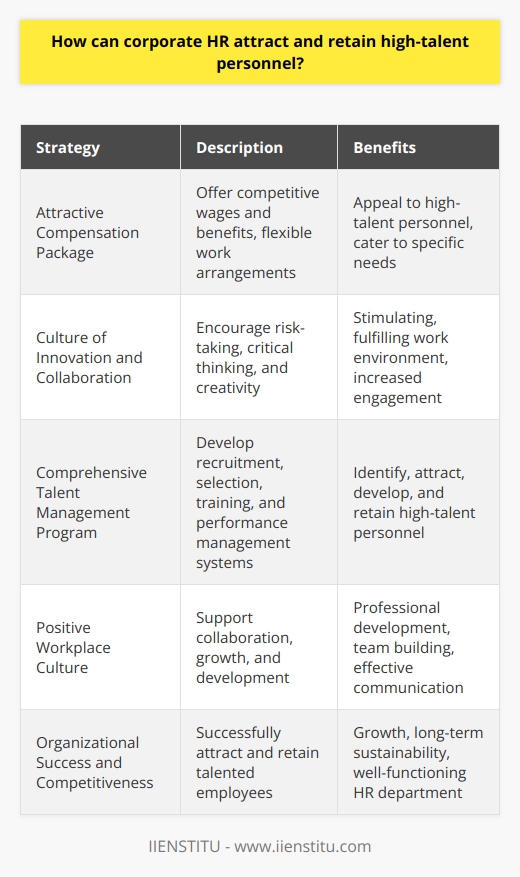
What opportunities are available for minorities and women to maximize career growth?
The opportunities for minorities and women to maximize career growth have increased significantly in recent years. This can be attributed to several factors, including the rise of technology, increasing access to education, and an overall shift in the workplace to promote diversity and inclusion.
When it comes to career growth, one of the most critical steps for minorities and women to take is to seek out educational opportunities. This can include taking classes, attending seminars and workshops, or obtaining a degree related to their desired career path. Education can open the door to networking opportunities, internships, and potential job offers. Additionally, having a degree or certification can help boost one's confidence, which can benefit the job interview process.
Technology has also played a significant role in providing opportunities for minorities and women to maximize career growth. From job boards and networking websites to online courses and e-learning, numerous resources are available to help job seekers build their skills and increase their knowledge. In addition, social media platforms such as LinkedIn and Twitter can be invaluable in connecting with potential employers and staying up-to-date on industry trends.
Finally, organizations are increasingly focusing on diversity and inclusion initiatives to create a more equitable workplace. This can include recruiting minority and women candidates, establishing mentorship and sponsorship programs, and providing professional development opportunities. These initiatives can create a more inclusive environment that benefits all employees and can lead to increased career growth opportunities for minorities and women.
In conclusion, numerous opportunities are available for minorities and women to maximize career growth. From seeking out educational opportunities to utilizing technology and taking advantage of diversity initiatives, these steps can help to further one's career and open the door to new and exciting opportunities.
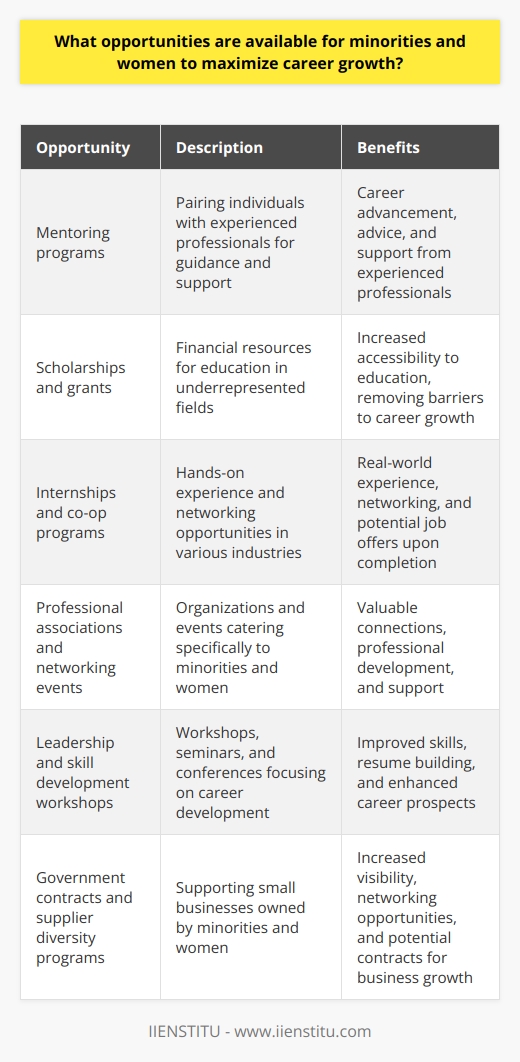
How can HR professionals increase their career opportunities?
**Understanding Current Industry Trends**
To increase their career opportunities, HR professionals must first develop a clear understanding of the current trends in the industry. Actively engaging in professional development programs, attending conferences, and researching the latest industry publications helps HR professionals stay informed of the latest innovations and challenges faced by the sector. This knowledge will equip them with the necessary insights to be proactive in their positions and adapt to changes in their organization, making them an indispensable part of the team.
**Building a Strong Professional Network**
Developing a strong professional network is another crucial step for HR professionals to enhance their career prospects. By joining professional associations, participating in networking events, and connecting with individuals on platforms such as LinkedIn, HR professionals can build relationships and form strategic partnerships with peers in their field. These connections will give them access to new opportunities and provide valuable information about potential job openings, industry trends, and best practices.
**Acquiring Relevant Certifications**
HR professionals should also consider acquiring relevant certifications to validate their expertise and demonstrate their commitment to the field. Some widely recognized certifications within the human resources industry include the Professional in Human Resources (PHR), the Senior Professional in Human Resources (SPHR), and the Society for Human Resource Management Certified Professional (SHRM-CP). These certifications not only showcase HR professionals' knowledge and skills but also signal to potential employers that they are invested in their career growth and committed to staying current with industry developments.
**Expanding Skills and Expertise**
To further increase their career opportunities, HR professionals should seek to expand their skillset beyond their primary area of expertise. By acquiring skills in areas such as data analysis, project management, and change management, HR professionals can showcase their versatility and adaptability, positioning themselves as valuable contributors to an organization. Additionally, developing strong communication, critical thinking, and problem-solving skills will make HR professionals more effective in their roles while also increasing their marketability to potential employers.
**Seeking Opportunities for Growth**
Finally, HR professionals should actively seek opportunities for growth by pursuing new experiences and personal development within their organizations. Engaging in cross-functional projects, volunteering for leadership roles, and contributing to strategic initiatives are all ways for HR professionals to gain exposure and demonstrate their skills. Taking on these challenges not only expands one's resume but also develops the skills and experience needed to advance in a competitive job market.
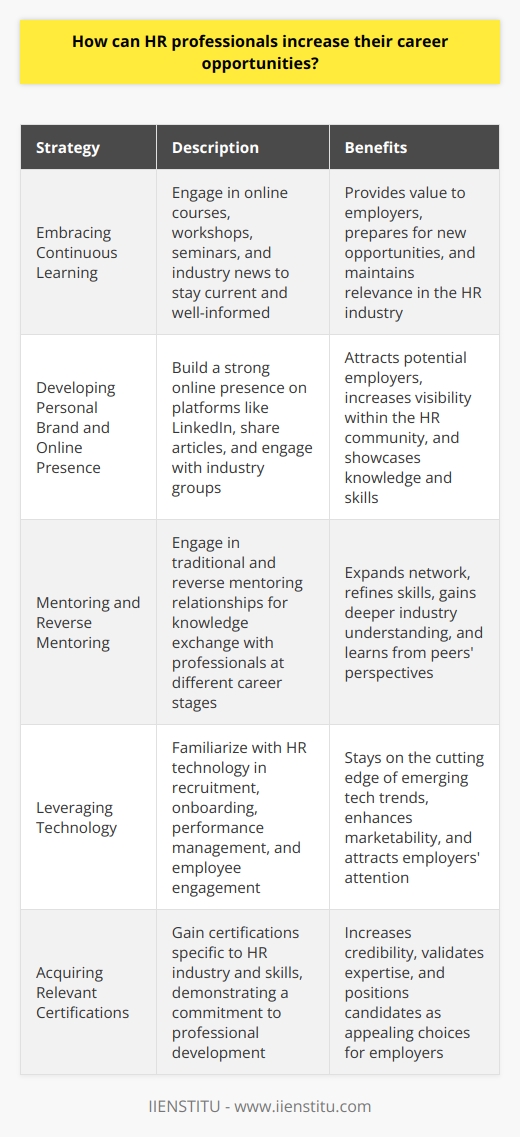
How does HR contribute to company growth?
Role of HR in Company Growth
Human Resources (HR) plays a crucial role in company growth by strategically aligning its workforce with the organization's goals. Through employee selection, HR ensures the workforce consists of highly skilled and talented individuals capable of driving the company's productivity and innovation. By engaging in targeted recruitment efforts, HR acquires top talents who contribute substantially to the company's growth trajectory. Furthermore, a diverse and inclusive workforce achieved through effective HR strategies can lead to better decision-making and creative solutions essential for organizational growth.
Employee Development and Retention
Another vital contribution of HR to company growth is employee development, facilitated through regular training and career advancement opportunities. HR invests in nurturing employees by providing ongoing learning opportunities, professional development programs, and performance feedback. These efforts enable the workforce to expand their skill sets and adapt to rapidly changing market demands, in turn enhancing the company's competitive edge. In addition, HR's role in employee retention is pivotal, as maintaining a low turnover rate preserves company knowledge and reduces the costs associated with hiring and training new employees.
Effective Performance Management
HR's involvement in performance management is central to driving company growth. By setting clear performance expectations, providing regular feedback, and designing effective reward systems, HR ensures employees are motivated and aligned with the organization's objectives. Furthermore, HR can identify and address underperformance, ensuring the company consistently operates at peak efficiency. The effective performance management strategies implemented by HR enable the business to stay competitive and foster a culture of excellence, ultimately contributing to company growth.
Employee Well-being and Engagement
Lastly, HR contributes to company growth by prioritizing employee well-being and engagement. By promoting a healthy work-life balance, fostering a supportive work environment, and encouraging open communication, HR boosts employee morale and job satisfaction. Highly engaged employees are more likely to perform at their best, be innovative, and share their organization's commitment to achieving its strategic objectives. This commitment results in increased productivity, loyalty, and company growth, ultimately distinguishing the organization as an employer of choice.
In conclusion, HR's strategic involvement in employee selection, development, retention, performance management, and well-being furthers company growth by optimizing human capital. By ensuring the organization cultivates a skilled, diverse, and engaged workforce, HR plays an indispensable role in driving growth and maintaining a competitive edge in the marketplace.
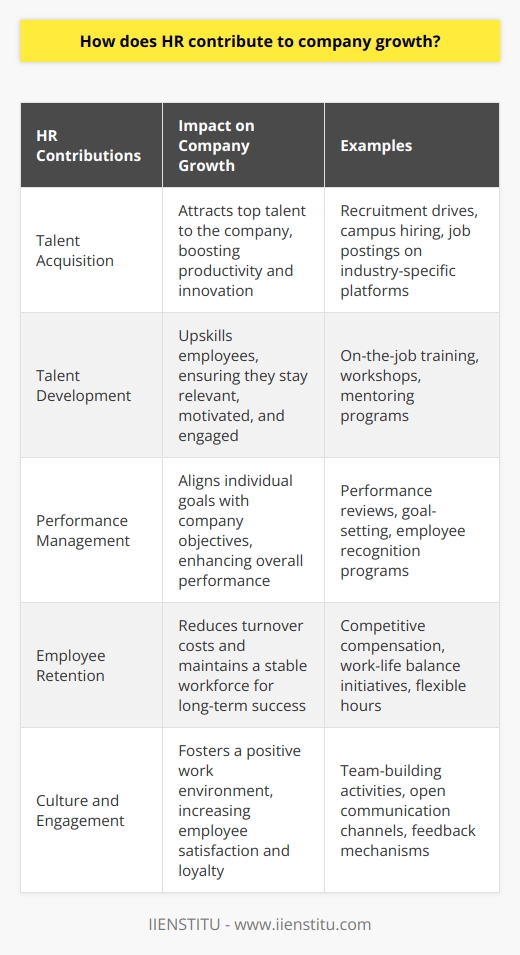
How can human resources be maximized?
Optimizing Human Resource Management
To maximize human resources, organizations must first focus on effective human resource management (HRM). This involves the strategic planning and implementation of policies that enhance employee performance, commitment, and job satisfaction. Improved HRM can lead to higher productivity and overall organizational success.
Comprehensive Training Programs
One approach to maximize human resources is through comprehensive training and development programs. These not only equip employees with the necessary skills and knowledge but also foster a culture of continuous learning and growth. Tailored training programs unleash employees' potential, enabling them to contribute effectively to the organization's objectives.
Performance Evaluation and Feedback
Regular performance evaluations are essential to ensure that employees remain aligned with the organization's goals. Providing timely and constructive feedback allows employees to understand their strengths and address areas for improvement. By setting clear expectations and offering support, organizations can foster a collaborative environment, leading to increased productivity and efficiency.
Employee Engagement Strategies
A key factor in maximizing human resources is employee engagement. By developing strategies that promote open communication, recognition and rewards, and a healthy work-life balance, organizations can motivate employees and maintain high levels of job satisfaction. Engaged employees are more likely to be committed to their roles, resulting in reduced turnover and higher retention rates.
Flexible Work Arrangements
Introducing flexible work arrangements can also optimize human resources. This could include options such as remote work, flexible hours, and job-sharing. Such arrangements help employees balance their personal and professional lives, leading to increased job satisfaction and improved mental health. This, in turn, results in higher productivity and a more dedicated workforce.
Inclusive and Diverse Workforce
Finally, promoting diversity and inclusion in the workplace is another way to maximize human resources. An inclusive and diverse workforce leads to a more dynamic organization with varied perspectives and skill sets. By implementing policies that encourage diversity, organizations can tap into a wider talent pool, ultimately driving innovation and growth.
In conclusion, organizations can maximize human resources by focusing on effective HRM strategies, including training and development, performance evaluations, employee engagement, flexible work arrangements, and workplace diversity. By adopting these approaches, an organization can effectively cultivate a high-performing and committed workforce, contributing to overall success.
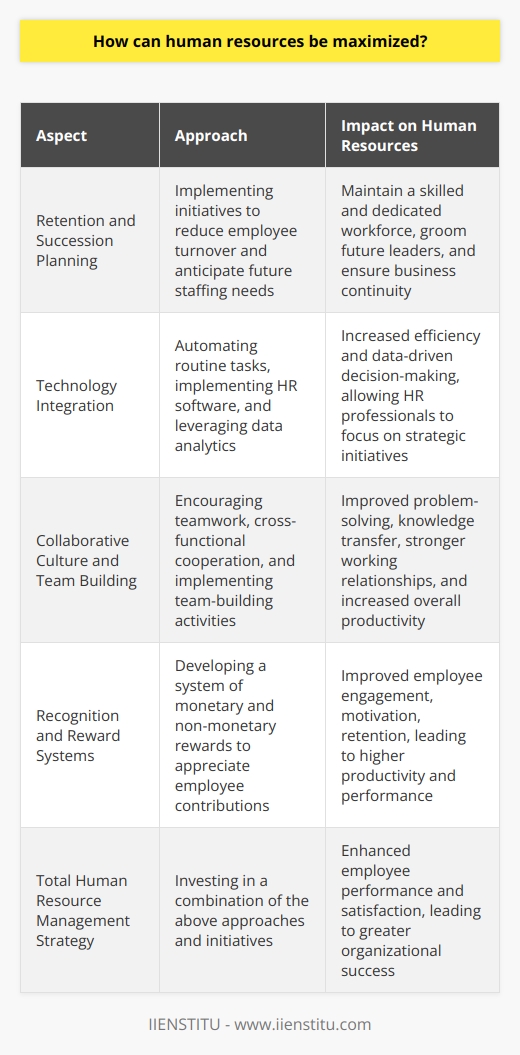
What is the Ulrich HR model and how does it contribute to organizational effectiveness?
**Understanding the Ulrich HR Model**
The Ulrich HR model, created by HR expert Dave Ulrich, provides a strategic framework for human resources (HR) professionals to enhance their contribution to organizational effectiveness.
**Four Key Roles (and Responsibilities) of HR Professionals**
This model involves four key roles that HR professionals need to perform: strategic partner, change agent, employee advocate, and administrative expert. By performing each of these roles, they participate in shaping the organization's structure, culture, and processes to better achieve its goals.
**Strategic Partner Role**
As strategic partners, HR professionals align HR strategies and practices with organizational objectives. They help develop and implement strategies that nurture and mobilize human capital to increase competitive advantage.
**Change Agent Role**
HR professionals, acting as change agents, anticipate the need for change and drive transformation within the organization. They facilitate and support the implementation of new initiatives and ensure that employees are prepared for and involved in the change process.
**Employee Advocate Role**
In the employee advocate role, HR professionals act as a voice for employees, ensuring their needs, concerns, and interests are fairly represented. They promote a positive, supportive work environment that leads to increased employee satisfaction and performance.
**Administrative Expert Role**
As administrative experts, HR professionals manage organizational resources efficiently and effectively to streamline HR processes such as recruitment, training, and compensation. They ensure that these processes run smoothly and provide a strong foundation for the other roles.
**Contributing to Organizational Effectiveness**
The Ulrich HR model contributes to organizational effectiveness by promoting a strategic approach to HR management. By fulfilling the four essential roles, HR professionals support the achievement of overall business goals through successful people management. Moreover, this model fosters a culture of continuous improvement and innovation by encouraging HR professionals to be proactive in identifying opportunities for growth and development. Furthermore, the emphasis on employee advocacy helps to facilitate a sustained high level of employee engagement, which, in turn, contributes to enhanced organizational performance. In summary, the Ulrich HR model empowers HR professionals to be more than just support functions and positions them as key contributors to the success of the organization.
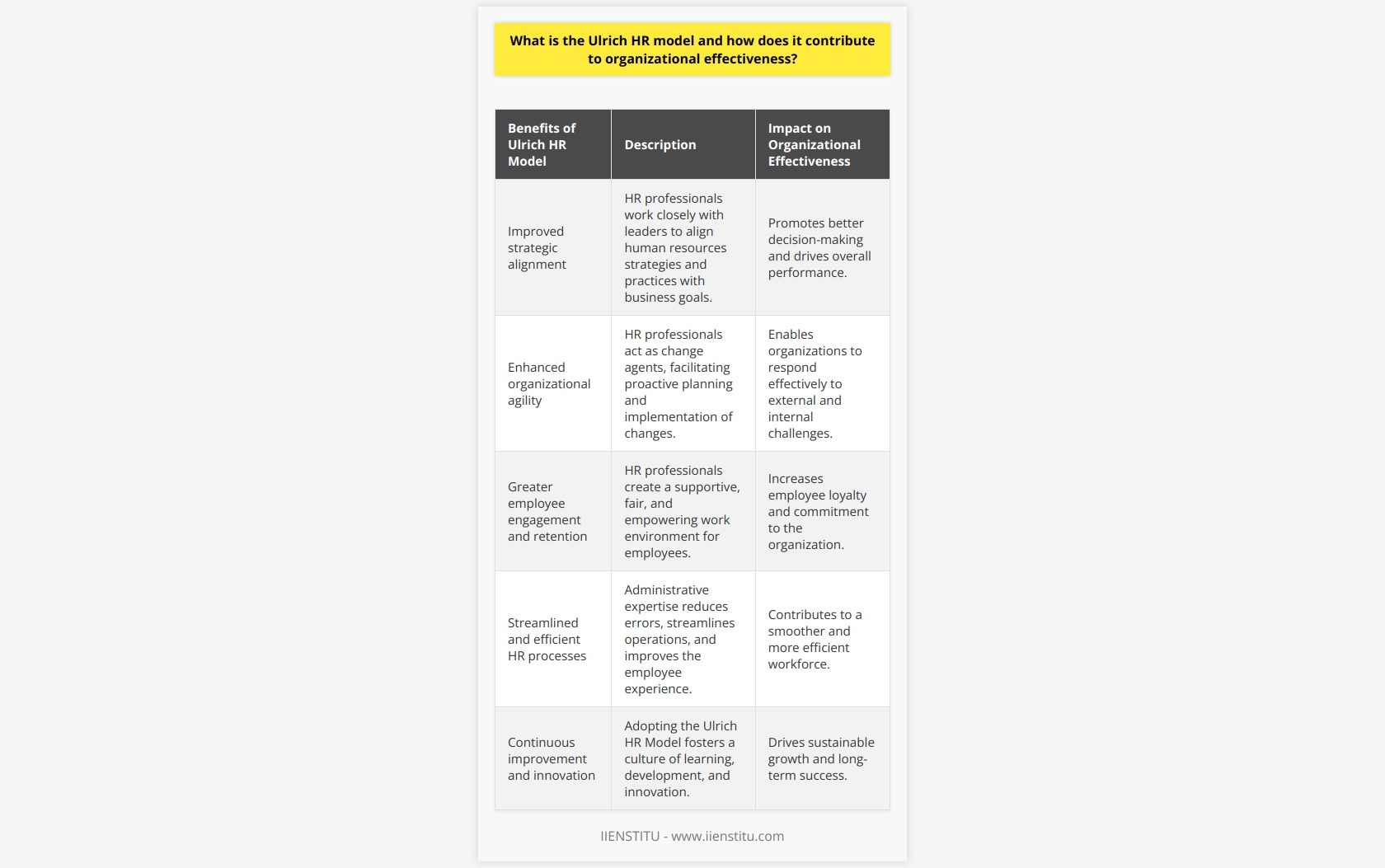
How can HR professionals stay updated on industry trends and innovations to enhance their skills?
Continuous Professional Development
HR professionals can stay updated on industry trends and innovations by engaging in continuous professional development (CPD). This entails participating in targeted learning activities, such as attending workshops, conferences, and seminars, as well as joining professional associations and networks. These platforms often provide access to industry-leading experts, research, and best practices.
Online Learning and Information Sources
Another efficient method to stay informed is by leveraging online resources, including webinars, podcasts, and e-learning courses. Many of these resources offer flexible, on-demand access to expert insights and training, enabling HR professionals to learn at their own pace. Subscribing to industry-specific publications, newsletters, and blogs can also help HR practitioners remain abreast of the latest trends and best practices in their fields.
Networking and Collaboration
Establishing connections with other HR professionals plays a crucial role in staying updated on industry trends and innovations. Networking through social media platforms, like LinkedIn, and participating in online forums and discussions enables the exchange of valuable insights and experiences among peers. Collaboration with colleagues and stakeholders can lead to new ideas and innovative practices that enhance HR professionals’ overall skillsets.
Understanding Data Analytics and Metrics
By becoming adept at data analytics and metrics, HR professionals can monitor trends and identify potential areas of improvement within their organizations. Analyzing industry-specific data can help professionals spot patterns and emerging trends, providing a foundation for informed decision-making and strategy development. Investing in appropriate data analysis tools can streamline this process, saving time and effort for HR professionals.
Embracing New Technologies
Finally, staying updated on the latest HR technologies and software solutions is crucial for enhancing professional skills. Continuous exploration and adoption of innovative tools, such as applicant tracking systems, performance management platforms, and learning management systems, can optimize HR processes and boost overall efficiency. Leveraging technology to stay ahead of industry trends allows HR professionals to provide value to their organizations and maintain a competitive edge in an ever-evolving landscape.
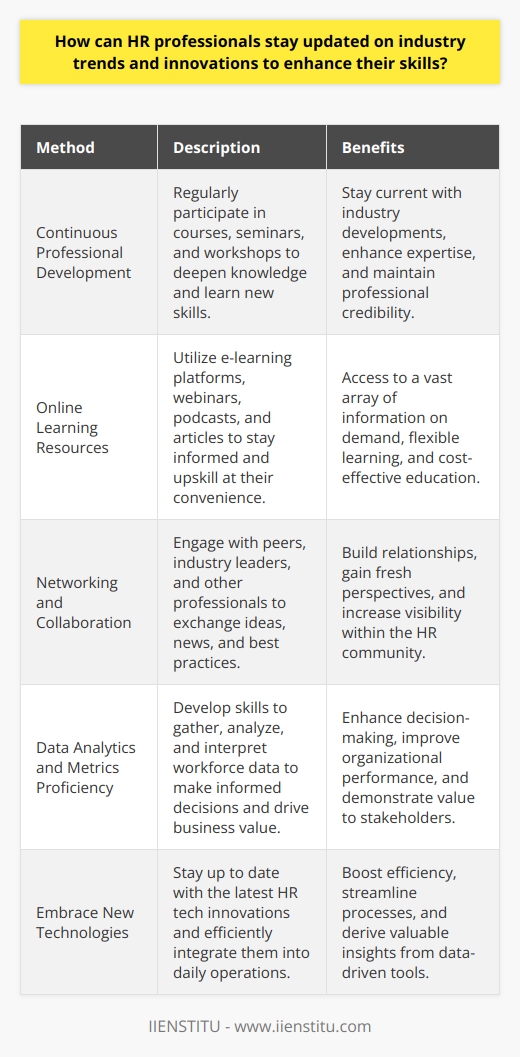
What are the ways in which HR can contribute to creating a diverse and inclusive workplace?
Understanding and Implementing Diversity
Human resources (HR) plays a pivotal role in fostering diversity and inclusion in the workplace by understanding and implementing various measures. One way HR can contribute is by establishing a clear company policy on diversity and inclusion, outlining the organization's values, and setting expectations for employee behavior.
Attracting Diverse Talent
In the hiring process, HR can attract diverse talent by marketing job opportunities to different demographic groups and using inclusive language in job postings. Also, offering flexible work arrangements and inclusive benefits packages appeal to candidates from various backgrounds.
Training and Education
Workplace training and education that focus on diversity and inclusion aid in creating a more inclusive environment. HR professionals should provide mandatory training on unconscious bias, which teaches employees to recognize and mitigate biases that may lead to discrimination, and offer supplemental courses to deepen understanding and foster a more inclusive mindset.
Employee Support
Employee support initiatives, such as affinity groups, provide opportunities for employees from different backgrounds to network and collaborate. These groups can also serve as a source of support and mentorship, helping employees feel valued and empowered to contribute to the company's success.
Performance Evaluation
To ensure consistent reinforcement of diversity and inclusion, HR can incorporate diversity goals into the company's performance evaluation system. This approach incentivizes staff to actively participate in creating and maintaining a diverse workplace, as their efforts have a direct impact on their performance reviews and, potentially, promotions or bonuses.
Inclusive Leadership
Lastly, HR plays a crucial role in promoting inclusive leadership by identifying and fostering leaders who understand the importance of diversity and inclusion. By providing training and mentorship to leaders, HR can equip them with the tools they need to effectively engage with and manage a diverse workforce.
By incorporating these measures into the workplace, HR professionals can create an organizational culture that values and supports diversity and inclusion, ensuring that all employees feel respected, valued, and able to realize their full potential.
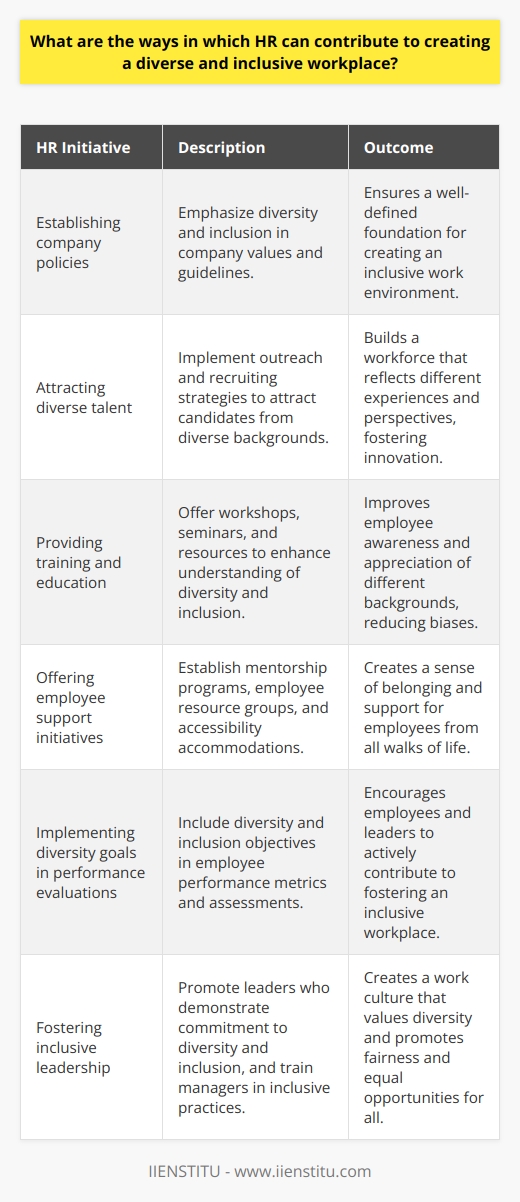
What is the role of corporate human resources in fostering an innovative and collaborative environment?
The Role of Corporate HR in Cultivating Innovation and Collaboration
In today's rapidly evolving business landscape, the importance of fostering an innovative and collaborative work environment cannot be overemphasized. Corporate human resources (HR) departments play a crucial role in the development of such atmospheres by focusing on various elements, including organizational culture, employee engagement, and talent management.
Developing a Conducive Organizational Culture
A key role played by corporate HR in fostering innovation is building and maintaining a conducive organizational culture. HR professionals create environments where employees feel comfortable sharing their thoughts and opinions, which in turn, drives creativity, collaboration, and innovation. This is achieved through consistent communication of the organization's expectations, values, and vision, as well as providing platforms that facilitate creative problem-solving and open discussions.
Encouraging Employee Engagement
The engagement of employees has a direct impact on their motivation and willingness to come up with new ideas, collaborate with others, and seek innovative solutions. HR drives employee engagement through initiatives such as promoting work-life balance, professional development opportunities, and recognition programs. These efforts result in a workforce that feels valued, connected, and motivated to contribute to the organization's success.
Attracting and Retaining Talent
Talent acquisition and retention are other vital components addressed by HR in the quest for innovation and collaboration. This involves identifying and recruiting individuals who possess a strong inclination towards creative thinking and teamwork, as well as implementing practices that retain these valuable team members. HR supports talent development through training programs and mentorship, enabling employees to continuously grow and contribute to the company's innovative efforts.
Promoting Diversity and Inclusion
A diverse and inclusive workforce encourages a broad spectrum of perspectives, resulting in an environment ripe for generating innovative ideas. HR plays an instrumental role in ensuring diversity and inclusion by developing policies and practices that attract candidates from various backgrounds, focusing on unconscious bias training, and continually emphasizing the importance of respecting and valuing diverse viewpoints.
In conclusion, the role of corporate HR in fostering an innovative and collaborative environment is multi-faceted, involving the cultivation of a conducive organizational culture, the engagement and development of employees, and the promotion of diversity and inclusion. By addressing these essential areas, HR professionals contribute to a workplace that not only possesses the potential for innovation and collaboration but also drives the organization's long-term growth and success.
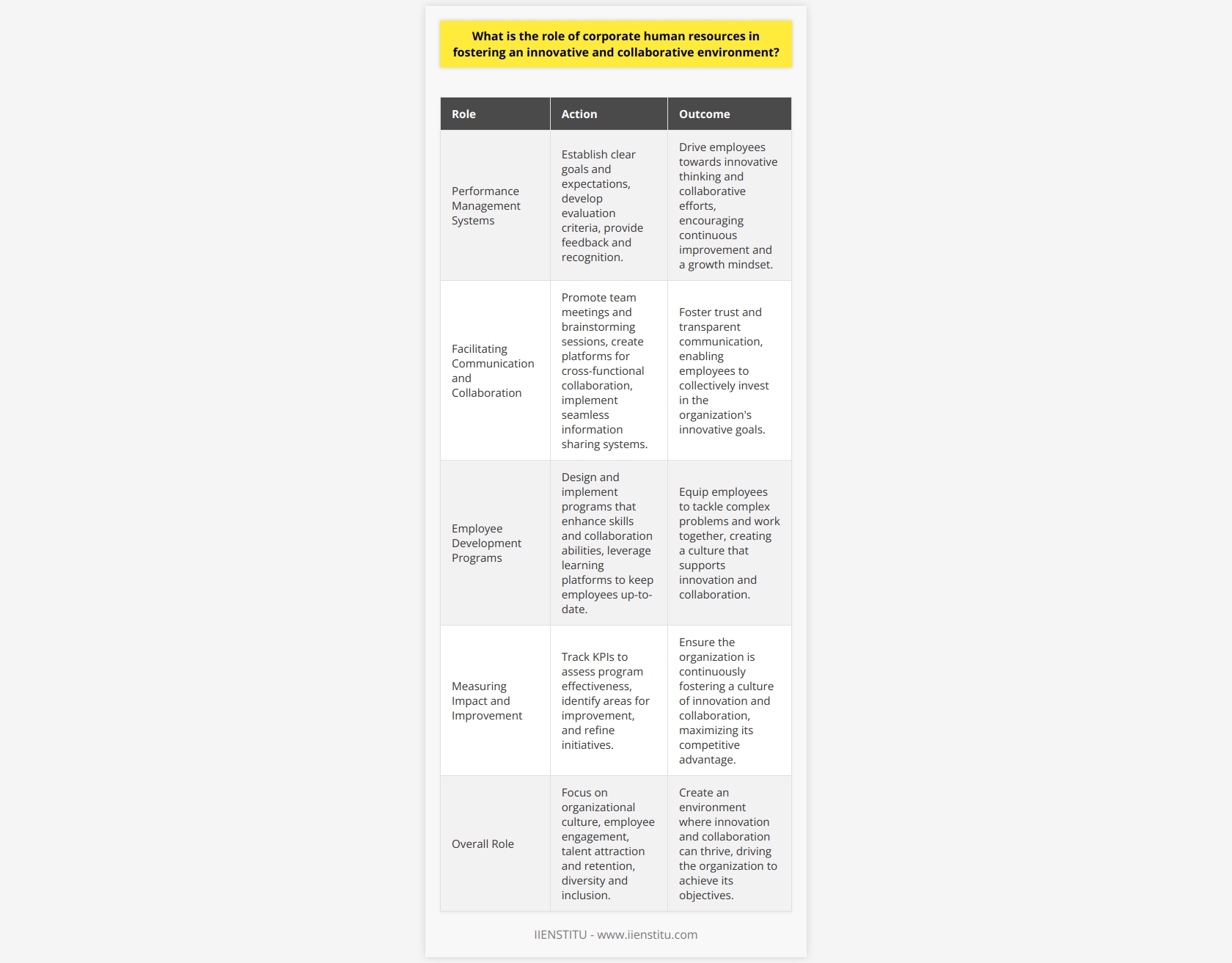
How can the implementation of the Ulrich HR model improve workforce efficiency and productivity?
**Ulrich HR Model Overview**
The Ulrich HR model, developed by Dave Ulrich, revolves around segregating HR functions into four essential roles, namely: the strategic partner, change agent, employee advocate, and administrative expert. This model aims to align HR practices with the organization's strategic goals, improve operational efficiency, and enhance employee engagement and performance.
**Aligning with Organizational Goals**
To improve workforce efficiency and productivity, the strategic partner role emphasizes aligning HR initiatives with business objectives. HR professionals collaborate with management to create policies and programs that address the organization's needs, which contribute to improved operational efficiency and achieving strategic goals.
**Enhancing Operational Efficiency**
As administrative experts, HR professionals streamline processes and implement best practices to reduce costs and improve overall operational efficiency. By assessing current systems and identifying areas for improvement, HR can develop effective solutions that directly impact workforce efficiency and productivity.
**Promoting a High-Performance Culture**
The change agent role focuses on fostering a high-performance culture among employees. HR professionals play a pivotal role in introducing and managing change within the organization, ensuring employees feel supported and equipped to adapt to new processes or technologies, thus improving productivity.
**Employee Advocacy and Engagement**
Lastly, as employee advocates, HR professionals nurture a positive work environment, empowering employees to reach their full potential. By addressing employee concerns, promoting work-life balance, and offering professional development opportunities, HR enhances employee engagement and satisfaction, which in turn boosts productivity.
In conclusion, the implementation of the Ulrich HR model fosters enhanced workforce efficiency and productivity by aligning HR practices with organizational goals, improving operational efficiency, promoting a high-performance culture, and encouraging employee advocacy and engagement. By focusing on these four key roles, HR professionals can contribute significantly to the overall success and competitiveness of their organizations.
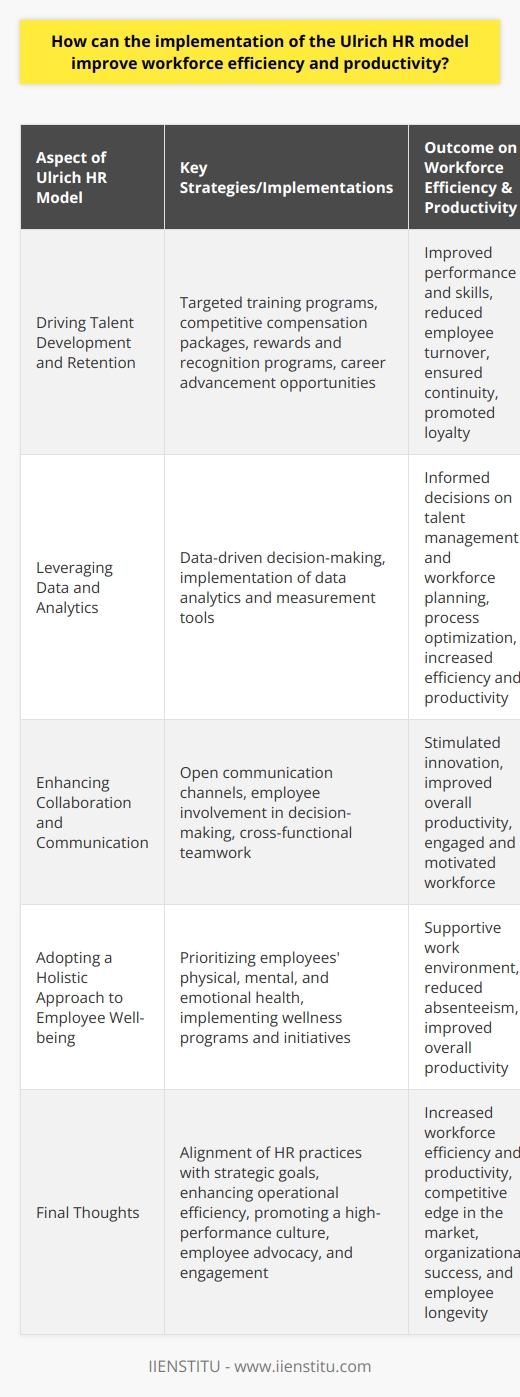
What are some effective methods for HR professionals to cultivate a strong organizational culture and improve employee engagement?
Methods for Cultivating a Strong Organizational Culture
To enhance employee engagement, HR professionals play an essential role in fostering a supportive organizational culture. One effective method is to develop clear communication channels, allowing employees to express their ideas and opinions without fear of retribution. Active listening and transparent communication can strengthen the sense of belonging among employees, promoting trust and cohesion within the team.
Incorporating Recognition and Rewards
Another influential method is to incorporate a recognition and rewards system, which acknowledges employees' contributions and achievements. This can take the form of verbal praise, promotions, or monetary incentives, all of which enhance motivation and job satisfaction. Recognizing employees' efforts not only has a positive impact on their morale but also encourages continued engagement and performance enhancement.
Providing Training and Development Opportunities
Offering continuous employee training and development should be a top priority for HR professionals aiming to bolster organizational culture. This includes on-the-job training or external workshops that enable employees to strengthen their skills and competencies. Providing development opportunities showcases the organization's dedication to growth and improvement, in turn fostering increased engagement and loyalty from employees.
Promoting Work-Life Balance
A well-balanced work-life environment leads to a healthier and happier workforce, in turn fostering strong organizational culture. HR professionals should encourage work-life balance by supporting flexible work arrangements and promoting employee wellness initiatives, such as mental health resources or physical activity opportunities. By prioritizing employee well-being, HR professionals may improve overall engagement while simultaneously demonstrating the organization's commitment to employee care.
Creating an Inclusive Company Culture
To create a strong organizational culture, HR professionals must actively promote and implement strategies for diversity and inclusion. This involves addressing unconscious biases, ensuring a fair hiring process, and providing adequate support for employees from various backgrounds. By building a diverse and inclusive workforce, HR professionals not only benefit from accessing a broader talent pool but also create an environment in which employees feel valued and respected.
In conclusion, there are several effective methods for HR professionals to cultivate a strong organizational culture and improve employee engagement. These approaches include fostering clear communication, incorporating recognition and rewards systems, providing training and development opportunities, promoting work-life balance, and building an inclusive company culture. By implementing these strategies, HR professionals can significantly contribute to a positive working environment, ultimately leading to enhanced organizational performance and employee satisfaction.
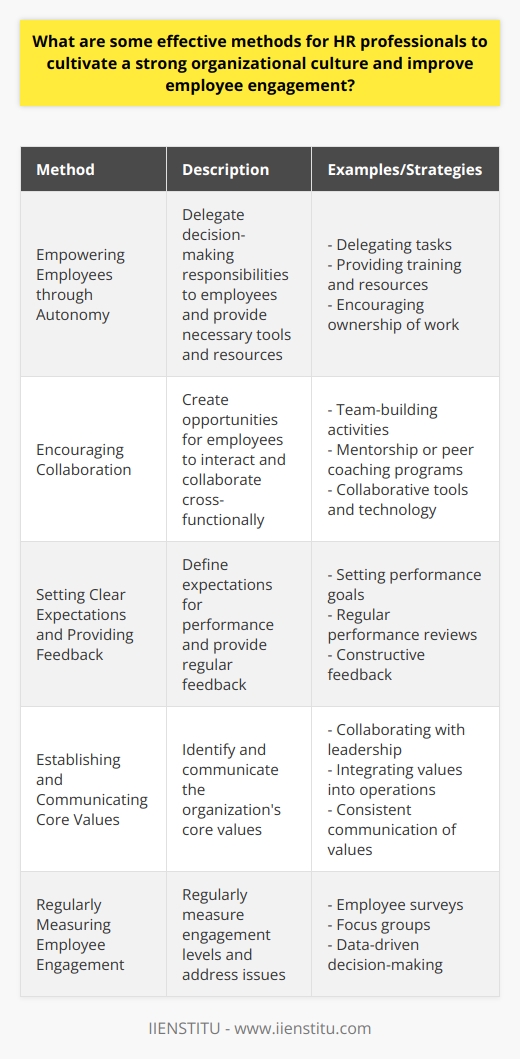
What is the role of corporate human resources in facilitating effective talent management and succession planning?
Role of Corporate Human Resources
Corporate human resources (HR) plays a critical role in facilitating effective talent management and succession planning. By strategically attracting, developing, and retaining employees, organizations can ensure they have the skills and expertise needed to maintain a competitive advantage in the ever-changing business landscape.
Attracting Talent
To begin with, HR professionals are responsible for developing and implementing recruitment strategies. They create job advertisements, identify potential candidates, and collaborate with hiring managers to design an efficient selection process. This ensures organizations bring on board the most suitable employees in terms of their skills, ambition, and cultural fit.
Developing Skills and Expertise
Beyond hiring, HR professionals also develop employees' competencies and careers to ensure their growth within the organization. This involves identifying skill gaps, providing opportunities for training and development, and supporting effective performance management. By doing so, HR helps to create a highly skilled, engaged, and motivated workforce aligned with the organization's objectives.
Retention Strategies
To retain top talent, HR must offer competitive compensation, benefits, and work-life balance. By conducting market research and benchmarking, HR professionals can ensure these offerings remain attractive. Furthermore, they must develop positive organizational cultures that prioritize employee satisfaction, implement reinforcement mechanisms, and regular feedback sessions. These retention strategies ensure talented individuals stay committed to the organization.
Succession Planning Process
HR professionals play an essential part in orchestrating succession planning, ensuring a ready pool of talent for critical roles. This includes conducting talent assessment exercises, developing leadership pipelines, and providing guidance on career progression. By facilitating smooth leadership transitions, HR contributes to organizational stability and continuity.
Evaluating and Updating Strategies
Finally, HR plays a vital role in monitoring and continuously improving their talent management and succession planning strategies. They assess the effectiveness of implemented approaches by leveraging key performance indicators, analytics, and employee feedback. This allows them to identify areas for improvement and ensure their strategies stay up-to-date with industry trends.
In conclusion, corporate human resources is instrumental in allowing organizations to effectively manage talent and plan for future leadership positions. By attracting, developing, retaining, and supporting the career progression of employees, HR professionals contribute significantly to an organization's success and financial growth.
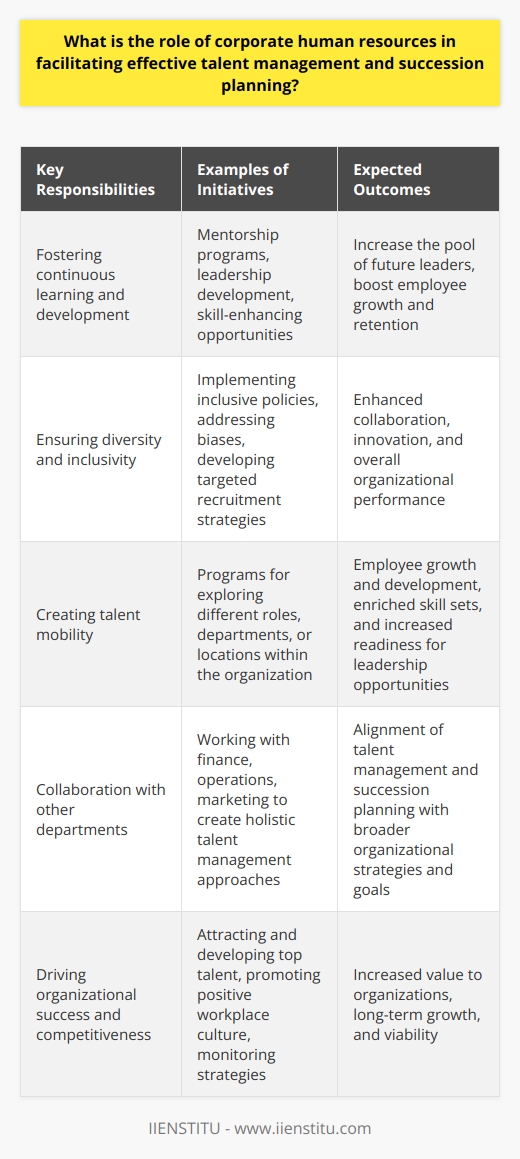
How can HR professionals leverage analytics and data-driven approaches to make informed decisions and optimize workforce strategies?
Understanding Data Analytics in HR
Data analytics and data-driven approaches have become increasingly significant in modern business environments, particularly for human resources (HR) professionals. By leveraging these techniques, HR practitioners can make informed decisions and optimize workforce strategies to boost organizational performance and employee satisfaction.
Implementing HR Analytics
The first step for HR professionals in leveraging analytics is understanding essential metrics and data sources relevant to their organization. Key performance indicators (KPIs) can include employee turnover rates, time-to-hire, cost-per-hire, and employee engagement. HR practitioners must also establish data collection methods and tools, such as surveys, performance reviews, and HR software platforms, to ensure accurate and reliable data.
Transforming Data Insights into Action
Once relevant data has been collected and analyzed, HR professionals must interpret these insights effectively. By understanding patterns and trends in the data, they can identify potential areas for improvement, such as reducing employee turnover or enhancing employee engagement programs. Moreover, HR practitioners can use these insights to inform their decision-making processes and align workforce strategies with organizational goals and priorities.
Optimizing Talent Acquisition
HR analytics can significantly impact talent acquisition efforts. By assessing factors such as time-to-fill and source-of-hire data, HR professionals can identify the best channels for recruiting high-quality candidates and filling vacancies quicker. Additionally, data-driven approaches can help organizations tailor their recruitment strategies to attract diverse talent, fostering a more inclusive and equitable work environment.
Driving Employee Engagement and Performance
Data-driven HR practitioners can dramatically improve employee engagement and performance by monitoring relevant metrics, such as employee satisfaction scores and performance appraisal outcomes. This information can guide the development of targeted professional development and training opportunities, as well as initiatives to enhance workplace culture and employee well-being. By continuously evaluating and refining these programs based on data insights, HR professionals can maximize their impact on employee performance and satisfaction.
Mitigating Legal and Ethical Risks
Finally, leveraging data analytics in HR can assist in identifying and addressing potential compliance challenges and ethical risks. By monitoring factors such as gender pay gaps, diversity, and discrimination incidents, HR practitioners can proactively address issues and ensure their organization operates in a legally compliant and socially responsible manner.
In conclusion, HR professionals who embrace data-driven approaches can significantly enhance workforce strategies and make more informed decisions. By understanding and utilizing relevant data, organizations can optimize talent acquisition, drive employee engagement, and mitigate potential risks, ultimately achieving greater success in today's competitive business landscape.
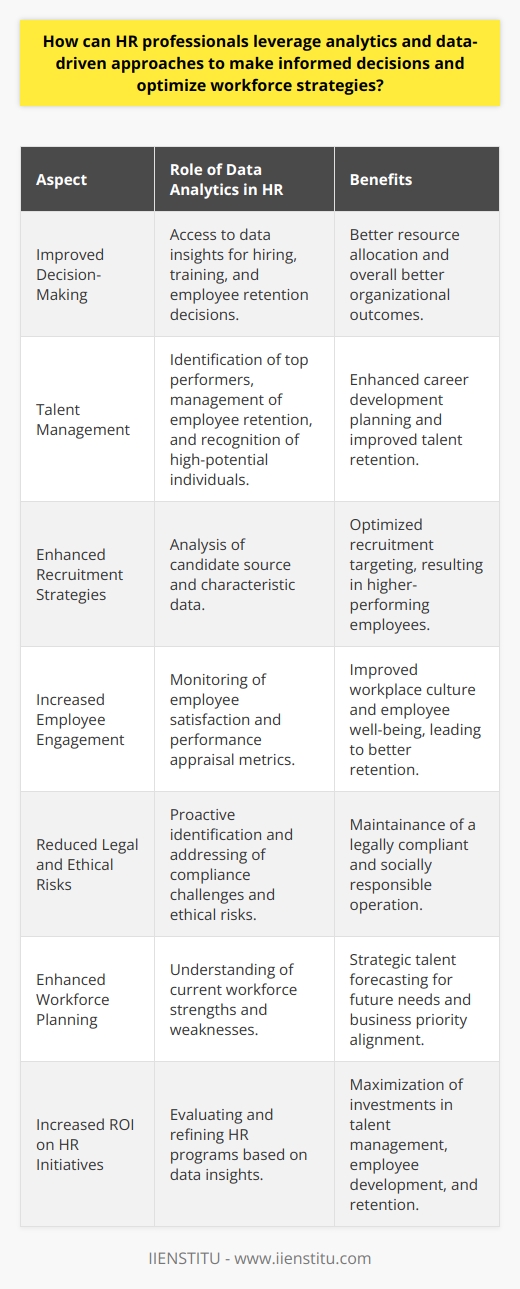
In implementing the Ulrich HR model, how can HR professionals ensure a balance between the operational, strategic, and transformative aspects of their roles?
Balancing Operational, Strategic, and Transformative Roles
To effectively implement the Ulrich HR model, HR professionals must balance the operational, strategic, and transformative aspects of their roles. Achieving this balance requires a holistic approach, ensuring that each element is effectively integrated with the other aspects of the HR function.
Operational Excellence and Efficiency
Firstly, HR professionals must excel in operational efficiency, which involves streamlining HR processes, such as recruitment, employee relations, and compensation management. By ensuring that these HR activities are cost-effective and timely, HR professionals can create a solid foundation for the strategic and transformative aspects of their role. This can be achieved through process improvements, embracing digital solutions, and continuous refinement based on performance metrics and feedback.
Aligning HR Strategy with Business Objectives
Secondly, HR professionals need to ensure that their strategic activities align with the broader business objectives. This entails performing a thorough analysis of the organization's goals and executing relevant HR initiatives to support these goals. By establishing clear performance targets and measuring the success of the HR initiatives, professionals can ensure that their efforts contribute positively to the overall organizational success. This alignment and focus on driving meaningful impact can enable HR professionals to act as strategic business partners, rather than just being perceived as administrative support functions.
Fostering Transformation and Innovation
Finally, HR professionals must embrace their transformative role within the organization. This involves fostering a culture of innovation and change, driving employee engagement initiatives, and being the catalyst for ongoing learning and adaptability. By challenging the status quo and encouraging continuous improvement, HR professionals can contribute to the overall performance and sustainability of the organization. This can be achieved through initiatives such as talent management, leadership development, and fostering cross-functional collaboration and synergies within the organization.
In conclusion, HR professionals need to strike a balance between operational, strategic, and transformative aspects of their roles when implementing the Ulrich HR model. By excelling in operational efficiency, aligning HR strategy with business objectives, and fostering transformation and innovation, HR professionals can play a crucial role in driving organizational success and creating a sustainable competitive advantage in today's constantly changing business environment.
